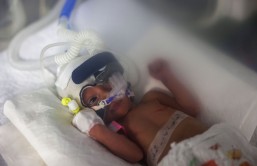Migraine sufferers have been sharing their testimonials all over social media about a particular "cure" that has finally given them freedom from frequent headaches: daith piercing. Could there be a medical explanation for this?
According to experts, the principle of using daith piercing as a migraine cure arises from an acupuncture technique that targets the innermost cartilage fold of the ear in order to give patients relief from intense headaches. However, no concrete link has been established between daith piercing and migraine relief, reported Metro.
"One of the non-traditional treatments beyond medication has been acupuncture. One of the areas of needle placement has been in the ear, and commonly in the same general area where daith piercings are placed," pain management physician Thomas Cohn explained in his blog.
Although Cohn said the association between migraines and daith piercing are yet to be studied, he recommended that people suffering from migraine attacks visit an acupuncturist to check if piercing their ear's innermost cartilage would make the pain go away. If it works, Cohn said, it could be worth a try to have a daith piercing.
"Since body piercings are generally less than $100, this may be a very economical treatment alternative," said Cohn. "If this is not working, and the migraines are not being well managed, further discussions with your medical practitioner about treatment options is warranted."
Migraine Action CEO Simon Evans disagrees with Cohn, saying that even if daith piercings did give relief to some migraine sufferers, this does not mean it would apply to everyone. It could even make other people's migraines worse.
"We are always pleased when people gain some measure of relief from their migraine. Unfortunately, what works for one person can make the condition worse in others, so we have to treat the daith piercing with a degree of caution, especially in these very early days after the procedure has been done," Evans told the Daily Mail. "We would highly recommend that all migraine patients continue with the treatment that has been prescribed by their medical professional."








